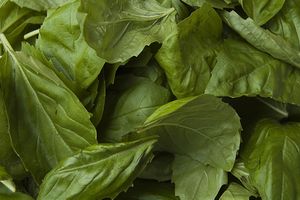Note: This is a project under development. The articles on this wiki are just being initiated and broadly incomplete. You can Help creating new pages.
Difference between revisions of "Ocimum basilicum - Basil leaves"
Chaithrika (talk | contribs) |
|||
| Line 11: | Line 11: | ||
*The Chinese also use fresh or dried basils in soups and other foods. | *The Chinese also use fresh or dried basils in soups and other foods. | ||
*When soaked in water, the seeds of several basil varieties become gelatinous, and are used in Asian drinks and desserts such as faluda, sharbat-e-rihan. | *When soaked in water, the seeds of several basil varieties become gelatinous, and are used in Asian drinks and desserts such as faluda, sharbat-e-rihan. | ||
| + | |||
| + | ==Common name== | ||
| + | |||
| + | * '''English''' - Basil leaves | ||
| + | * '''Kannada''' - ತುಳಸಿ ಎಲೆಗಳು | ||
| + | * '''Hindi''' - तुलसी की पत्तियां | ||
== External Links == | == External Links == | ||
Revision as of 11:32, 24 February 2017
Basil leaves , also called great basil, Ocimum basilicum or Saint-Joseph's-wort, is a culinary herb of the family Lamiaceae (mints). It is also called the "king of herbs" and the "royal herb". The name "basil" comes from Greek βασιλικόν φυτόν (basilikón phutón), "royal/kingly plant". This medicinal herb can help with flatulence, lack of appetite, cuts, and scrapes.
Harvest the young leaves of this annual plant as needed.
Uses
- Basil is most commonly used fresh in cooked recipes. In general, it is added at the last moment, as cooking quickly destroys the flavor.
- Basil is one of the main ingredients in pesto—a green Italian oil-and-herb sauce.
- The Chinese also use fresh or dried basils in soups and other foods.
- When soaked in water, the seeds of several basil varieties become gelatinous, and are used in Asian drinks and desserts such as faluda, sharbat-e-rihan.
Common name
- English - Basil leaves
- Kannada - ತುಳಸಿ ಎಲೆಗಳು
- Hindi - तुलसी की पत्तियां
